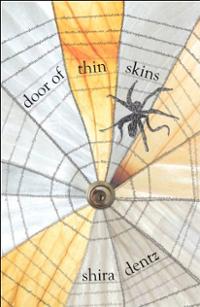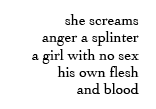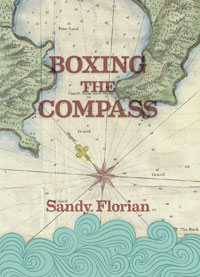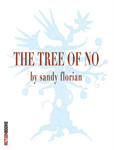Detachment: On Shira Dentz’ door of thin skins
 door of thin skins
door of thin skins
by Shira Dentz
CananKerry Press, 2013
96 pages / $16 Buy from Amazon
The retina is brain tissue that lines the inner surface of the eye, captures images of the visual world, and communicates them to the brain. Retinal detachment is a disorder in which the retina peels away from the eye. It is often caused by an injury or trauma to the eye or head that breaches the barrier. That breach that allows fluid to seep under the retina and to peel off the way wallpaper peels from a wall. Initially, the person might initially see clouds in their vision often called “floaters.” As detachment progresses, a moon-shaped shadow appears in the periphery of the visual field and starts to billow like a sail in the wind.
Shira Dentz’s door of thin skins narrates a fairy-tale-like story, “perhaps / a fairy tale,” of a young woman’s trials with her shapeshifting psychotherapist, Dr. Abe. Part lizard, part whale, part Macy’s Day balloon, Dr. Abe is a big man with narrow tongue, “but really it was such a narrow tongue.” Dr. Abe’s office is a veritable forest with its brambly hedges, placid buffalos, quick meadows, and spider plants. It is “fashioned according to Freud, lover of the primitive.” Trained at the White Institute along with Rollo May and under the tutelage of Eric Fromm, Dr. Abe also fashions his practice after one of the institute’s major influences, Sandór Ferenczi, the Hungarian psychoanalyst and contemporary of Freud.
Both Sandor Ferenczi and Otto Rank broke from Freud in the 1920’s to collaborate on the development of a different form of psychotherapy. Claiming that Freud’s requirement for emotional detachment on the part of the psychotherapist leads to “an unnatural elimination of all human factors in the analysis,” they endorsed a type of “here-and-now” approach that emphasized the clinical importance of attachment, intimacy, and intersubjectivity, encouraging more countertransference and mutuality between patient and doctor.
Ferenczi is also widely known for his “confusion of tongues” theory of trauma. In his essay on the topic, he explains that when children playfully communicate the desire to be the spouse of a parent, they are speaking with a infantile and tender tongue. “We find the hidden play of taking the place of the parent of the same sex in order to be married to the other parent, but it must be stressed that this is merely phantasy; in reality the children would not want to, in fact they cannot do without tenderness…” According to Ferenczi, the danger lies when the pathological adult misinterprets this call for tenderness as a call for passion.
In fact, in the 1920s, Freud broke from himself and repudiated his theory that female hysterics really suffered sexual abuse. According to Judith Herman, he did this because he could not cope with the truth that sexual abuse was pandemic and therefore repressed it. In my thinking, the same sort of repression may have occurred with Ferenczi in his “confusion of tongues theory,” for according to him, the confusion is still based on mutual dialogue, on the innocent participation on behalf of the child. Perhaps like Freud he couldn’t cope with the fact that many children do not participate in the conversation. They don’t call out for tenderness in some sort of spousal fantasy. Instead they cry angrily for safety while the “pathological” adult ignores these calls and forces the “pathological” tongue upon the child. Certainly this is true of Dentz’s child.

Here, Dentz speaks to the event in the third person. When she screams, when she articulates her infantile and angry tongue. Her voice is detached from first-person self, for the “I,” could no longer bear witness to real world but instead is left floating in a world of chaos.
July 26th, 2013 / 11:00 am
Mourning into Joy: Boxing the Compass by Sandy Florian
 Boxing the Compass
Boxing the Compass
by Sandy Florian
Noemi Press, 2013
114 pages / $15 Buy from Noemi Press or Amazon
If Sandy Florian’s novella Boxing the Compass is the answer, then the question might be: is the era of climate change spawning a specific literature? Some exploration of this question will lead us into the astonishing work of mourning Boxing the Compass is.
Ironically, the phrase Homo sapiens is Latin for “wise man.” Like all species, the existence of Homo sapiens has always been finite. No divine favor, cognitive privilege, or technical fix has ever exempted Homo sapiens from eventual extinction. None ever will. Climate change just promises to turn this “eventual” extinction into an uncomfortably close event. In 2010, the renowned Australian microbiologist Frank Fenner hypothesized Homo sapiens will go extinct within a century. Entertain Fenner’s hypothesis, and then try to write a book for the ages: for at most two or three generations more.
Whatever else climate change is, it is an event in language. The extinction of myriad species of fish should make writers differently aware of the biotic referents of tropes such as “to spawn a literature.” Extinctions bring about irreversible absences. The prospect of the extinction of Homo sapiens draws language into a hurricane swirling words up and away, or down and out, from anthropic referents. What happens to words as their referents irreversibly disappear? In becoming bereft of their referents, words may kindle mourning. Within language, climate change is metamorphosing frighteningly many words into words of mourning.
Imagine a novella catching intimations of the oceans in their terrible fragility as sustainers of life by narrating a daughter in mourning for her mother. Imagine that, through the daughter’s grief, this novella allows the mourning climate change solicits in language to find articulation. With these imaginings, we arrive at Sandy Florian’s uncanny work of mourning, Boxing the Compass.
June 10th, 2013 / 11:00 am
(Eggs and Bacon): The Poem as Memoir?

What is memoir in poetry? We read prose memoirs and see how lives are stretched taut around themes: a chronology of water, a debilitating illness, a drug addiction, a nomadic childhood, a strange religion, insomnia-driven thinking. Themes become umbrella girding; living, the fabric that fills it out. But where does poetry fit into memoir? We could think about the confessional in poetry and say, yes this is the place where poetry and memoir meet. Plath on suicide attempts: “I have done it again. / One year in every ten / I manage it–” or Lowell, “My mind’s not right…I myself am hell.” Depression and mania are easily encapsulated states of being, but all poets write their lives, confessional or not. When Simic writes, “My mother was a braid of black smoke,” we assume he’s not writing fact-truth. Maybe he’s writing dream truth or metaphor truth. Maybe he’s just writing, and I’m extrapolating.
I started thinking about this when a poem of mine called “Man Builds a Guitar” went up online recently. It’s basically a persona poem in Jack White’s voice. I wrote it after watching the documentary It Might Get Loud and not being able to shake Jack White’s weird tinkering and instrument making from my head. So, it’s a persona poem, but it embodies themes and emotions I was thinking about at that particular moment in time. When I say, “I heard everything disappearing” what I meant was that my marriage was over and life as I knew it was evaporating in front of my eyes. I’m using the imagery of my childhood in the South and the sounds that take me back there to get at the particulars of silence-after-a-storm. This is a memoir poem even though it’s a persona poem. I mean, I don’t know Jack White, but I know me.
Matt Hart has a poem called “Sailing the Gut Boat,” that begins, “I made you a thing with no tongue / and gallons of new-fangled fog. I made you / a thing with nothing and nobody—not even / a surrealist screaming into an atlas….” Hart reminds us that you can fashion people and events into whatever you want (a nothing, even) on the page, but the truth of them still remains behind that fashioning.
Or take a short couplet poem, “Future,” by Emily Kendal Frey:
Florian | Wilkinson
Two new I’m super excited about, coming soon from Sidebrow Books, do a get! … …

Sandy Florian
Collages by Alexis Anne Mackenzie
April 2010
ISBN: 0-9814975-1-9
104 pages, 6×8 full color, perfectbound, $20
“A bellow that is not a bucket. A bucket that is not a bone. There is wisdom in slipping into oceans. Into those wider organs horning. The way churches slip into twilight. Stone after stone. See the plaything on the mantel. I lean toward the paintings. See the baby fastened on the mast. I lean toward the window. See the sea, see the ship, see the ship’s low hull. See the winding of vowels by the function of the fist.”
For a preview of On Wonderland & Waste, go to http://www.sidebrow.net/books/wonderland-amp-waste

Selenography
Joshua Marie Wilkinson
Polaroids by Tim Rutili
April 2010
ISBN: 0-9814975-2-7
103 pages, 6×8 full color, perfectbound, $20
“an owl breaks the
fold a cut tree spills
a soft crutch
hits
this dust
a freezer stocked
with I
happened
to myself in these very woods.”
For a preview of Selenography, go to http://www.sidebrow.net/books/selenography
Both books are available until March 31 at a special discounted rate of $30 for the pair, 25 percent off the cover price.
On Wonderland & Waste, featuring full-color collages by Alexis Anne Mackenzie, and Selenography, featuring full-color Polaroids from Califone’s Tim Rutili, are also available separately for $18, a 10 percent preorder discount.
The Tree of No by Sandy Florian
 from Action Books:
from Action Books:
The Tree of No, Sandy Florian’s second book, is now up for sale actionbooks.org. We are not officially releasing it until February, but to celebrate the end of the Year of the Squealing Pig and the start of the Year of Lemurs (All Over Our Bodies) we are starting to sell the books early on our website only.
Here’s an excerpt:
I become pregnant with a hole. Scoop it out and the void comes down on its head. Then give it thanks and sing into the pit. For he is mindful of me. For he is manful on me. I make a beast of him like I make a beast of the bird, like I make a beast of fish, like I make a beast of the sea scrolling under my feet.
This looks amazing. I have already ordered. Action Books is very on point.
While you’re at it, may I recommend Lara Glenum’s THE HOUNDS OF NO, Aase Berg’s REMAINLAND, and Tao Lin’s book if you don’t have it: all three of these I own and love. I also just ordered: MOMMY MUST BE A MOUNTAIN OF FEATHERS. How can you not want a book with that title?
